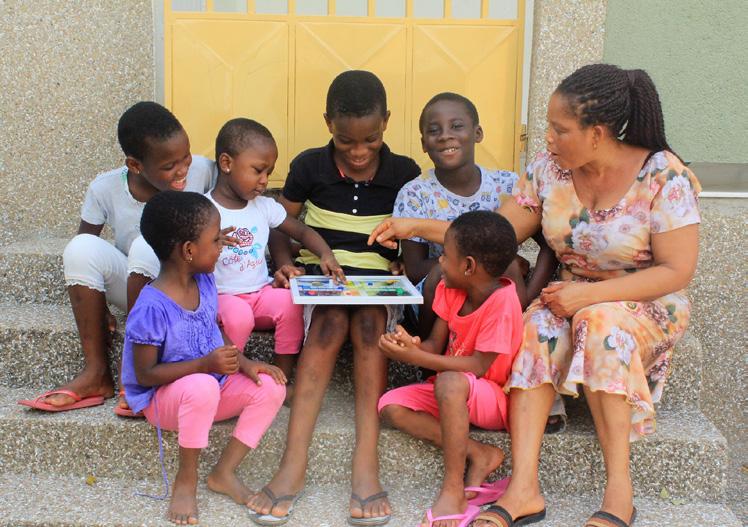social support. The reintegration process is
opment of children and young people and
closely guided by professional care providers,
the situation at home. We continue to
in which the relationship with and position in
provide the families with guidance and
relation to any other children in the family is
support, including psychological support,
an important focal point.
in 2021.
At the same time children are encouraged to
• At the end of 2020, draft legislation was
actively participate in children’s rights clubs
developed, based on research and
and peer network groups. So they will be able
recommendations by Uganda Makerere
to report best practices as well as recognise
University involved in the pilot and our
and report child abuse, exploitation and
international guidelines, which should
violations.
ensure that children no longer wrongly end up in an institution for alternative care.
Target group • 100 children aged 0-18 years who are
The vicious circle of separation and
their families due to social, economic or
abandonment has been broken: for children in
political reasons.
alternative care, the bonds with their own
• Vulnerable families in target districts who
these children can be reunited with and grow
inadequate capacity to provide care and
up safely within their own families. With our
protection to their family members.
advice to the government on the necessary quality standards for successful and safe
structures and staff whose capacity needs
reintegration, we advocate for them to be
to be developed in order to effectively
enshrined in national policy. At the same time,
implement the national alternative care
fewer children are unjustifiably entering
framework.
alternative care thanks to improved family-strengthening policies.
Uganda
Sustainable Development Goals
DURATION: October 2018 - December 2021 TOTAL BUDGET: €538,502 – spent in 2020 €170,344
This reintegration process must be handled
Focal points 2021
carefully. For this reason SOS Children’s
The project should have been completed in
Villages Uganda has taken the initiative to
2020, but because of Covid-19 and the
collaborate with a network of organisations
Main activities and results in 2020
resulting lockdown, the project’s duration has
and diligently map out the ideal reintegration
• 112 children and young people (57 from
been extended by a year.
Project description
children were neglected. At the same time,
process. In order to advise the government
the children’s village, 55 from six other
The ACCoSS (Alternative Care Consortium on
there are many tens of thousands of children in
accordingly on the necessary quality
institutes) were reintegrated in their
System Strengthening) pilot project focuses on
Uganda that really do have to fend for
standards that must be incorporated in
biological families. As a result of Covid-19
reintegrating children currently living in
themselves, but there is no place for them.
national policy.
the reintegration activities were halted
alternative care – institutional as well as the
SOS Children’s Villages Uganda, just like a
SOS Children’s Villages’ family-based care –
number of other organisations, has seized on
Prevention as the basic principle
with their biological parents or wider family.
the Ugandan Government’s reform policy to
In the context of the project families and
Immediate cause: the Ugandan Government
1. Perform a critical assessment of its own
communities are supported so they can
reintegrated children during lockdown.
continue to take care of their children instead
Families were hit hard due to the closure of
of the children being placed in institutional
schools and the fact that they could not
reform of care for children in alternative care.
placement policy (gatekeeping system);
Many children appeared to have been wrong-
2. Examine whether there are any children
during the year, the programme has now been extended by a year. • Telephone contact was maintained with the
fully living in orphanages as these children still
whose biological family is still around, which
care. We support parents/caregivers in
work. This caused financial as well as
have family. In addition, many institutions were
is now resilient enough, and whose home
looking after their children through activities
psychological stress. We distributed food
seemingly operating without any permits or
situation is stable enough for them to safely
for capacity building in the areas of parenting
parcels and school materials, but the
provided poor care, as a result of which the
return home.
skills, economic strengthening and psycho-
situation has had an effect on the devel-
23 | SOS CHILDREN’S VILLAGES ANNUAL REPORT 2020
families are re-established, so that many of
were separated from their children due to
• Government and local administration
ACCoSS REINTEGRATION PROGRAMME
Impact
placed in care after being separated from
• Further support and guidance for (the families of) 57 children in the Children’s Villages who have been reintegrated. • Reintegration of 43 children from the Children’s Villages in their families. • Development of sustainable reintegration policy for children placed temporarily in a Children’s Village.






















